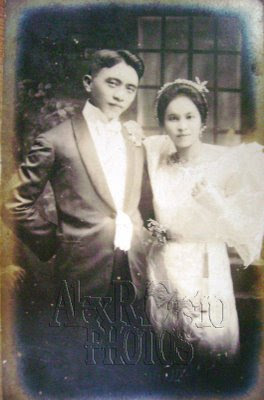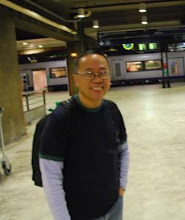 POWER OF TWO. The Nepomuceno couple, Juan and Teresa, had this wedding picture taken months after their actual wedding day, as they were still convalescing from their illnesses that left them emaciated and thin. With their many businesses, the 'Nepos' helped in shaping and defining the progress of Angeles as a town and later into a progressive city that it is today.
POWER OF TWO. The Nepomuceno couple, Juan and Teresa, had this wedding picture taken months after their actual wedding day, as they were still convalescing from their illnesses that left them emaciated and thin. With their many businesses, the 'Nepos' helped in shaping and defining the progress of Angeles as a town and later into a progressive city that it is today.The story of Angeles and its march to progress is inextricably linked to the remarkable partnership of a couple whose larger-than-life businesses shaped the course of the town’s economy while serving God and their beloved community.
Together, they singlehandedly opened the 1st electric plant and the crystal ice plant of the region. They ventured into softdrinks production, which, though shortlived, provided employment to hundreds of kabalens. Then, they established the country’s 1st Catholic school run by laypersons. In the 60s, they developed the city’s premiere subdivision that reconfigured the layout and social strata of Angeles. Around this, a new commercial business district was laid out by the couple and their children, whose very name today—“Nepo”—bears their enduring influence and legacy which continues to reverberate in the city today.
Juan de Dios Nepomuceno y Paras was born on 8 March 1892, the son of Juan Gualberto Nepomuceno or Kapitan Juan, a former head of Culiat (old name of Angeles) and Aurea Gomez Paras, his 2nd wife. Juan was descended from the original founders of Angeles, as his grandmother, Maria Agustina Henson y de Miranda was the granddaughter of Don Angeles Pantaleon de Miranda, the town’s first citizen. Juan was all set for a priestly vocation with the Jesuits, but ill health forced him to enroll at the University of Santo Tomas where he received his law degree, graduating summa cum laude in 1918.
Clara Teresa Teodora Gomez y Pamintuan was born on 12 August 1893, to parents Esteban Gomez and Josefa Pamintuan. Her paternal grandfather was Nicolas Gomez, who was an alias assumed by Fr. Guillermo Masnou, an Augustinian priest once assigned in Angeles. Though largely uneducated (she spent a few years at the Holy Family Academy), Teresa was active assistant to her mother, overseeing the household when still young. She also was to develop a knack for business.
Family lore has it that Juan actually acted as a go-between for a friend who wanted to woo Teresa. In the end, Juan ended up marrying Teresa with the prodding of Teresa’s Lola Barang. They were married on the feast of St. Joseph, 19 March 1919, after months of suffering from tuberculosis. In fact, so emaciated were they that they opted to have their wedding picture taken 6 months after the wedding, after they have recovered sufficiently.
The couple set up house in their Bale Maragul, along Santo Rosario, just across the church. Initially, Juan practiced law but the business minded Teresa sought other means of livelihood. In 1921, they set up Angeles Ice Plant, and just 2 years later, the Angeles Electric Light and Power Plant, which provided electricity to the town and which proved to be viable. Their power partnership paved the way for the modernization of Angeles, as more family businesses were established, including Reina and Aurora Softdrinks in 1928.
In 1933, in response to oldest son’s Javier's lobbying for a Catholic high school in Pampanga to serve local students (instead of going to Manila) saw fruition when his parents, together with Msgr. Pedro Songco Santos, founded the Holy Angel Academy. Holy Angel was envisioned to be a school for the masses, a secondary institution designed “to educate, uplift and prepare the youth to become socially efficient”. Today, it has grown into Central Luzon’s premiere and largest center of learning—the Holy Angel University.
In 1965, the Villa Teresa Subdivision was developed from the 64 hectare agricultural lands amassed by the Nepomucenos. It was transformed into a prime residential property that changed the city’s landscape and further escalated the pace of business in the adjacent commercial area. This even quickened with the establishment of the Nepo Mart Commercial Complex in 1968, a one-stop retail outlet where one could get their favorite and elusive PX goods. Nepo Mart has evolved many times since; now it houses a coterie of meat markets, fashion boutiques, shoe stores, dollar exchange shops and food outlets.
Juan and Teresa raised 10 children in all, each one raised in good old Kapampangan family values, and each one an achiever in their own right. Javier (b.1919) , a lawyer-CPA, rose to become a respected executive at the Ayala Corporation, Fr. Aureo (b.1921) became a Jesuit priest and was connected with Ateneo for the longest time, Geromin (b. 1923/d. 1975) was a former councilor of the city, Mamerto (b. 1925/d. 2002), a mechanical engineering graduate from Purdue University and taught at the UP, Carmelo (b.1927) became a doctor, Teresita (b.1929) earned a nursing degree in the U.S. , Aurora (b. 1930) and Flora (b.1932) managed their own successful family businesses, while Josefina (b. 1934) became a Benedictine nun. The youngest, Peter (b. 1936), an engineer, managed Angeles Electric Corp. and is largely credited with the successes of their other family enterprises. Geromin, Sr. Josefina and Mamerto all served as presidents of Holy Angel at different times. It is no wonder that in 1969, the Nepomuceno Family was awarded the Rizal Pro-Patria Award for Family Solidarity by then Pres. Ferdinand Marcos at rites in Malacanang.
Throughout their lives, Juan and Teresa shared their triumphs not only with their family, but also with the community through their philanthropic works, socio-civic activities and advocacies. Juan served as the town mayor for 2 consecutive 3-year terms (1922-1928) and represented the 1st District of Pampanga in the 1935 Constitutional Convention. The generous patriarch also supported scores of seminarians in their studies and translated religious writings like “Our Daily Bread” into Kapampangan (“Ing Kakanan Mi King Aldo-Aldo”). For his services to the church, Juan received the Papal Award, “Knight of St. Sylvester”.
Teresa was an indefatigable champion of woman’s suffrage and even ran unsuccessfully for the vice-mayoralty of Angeles at the time the Socialists were gaining patronage. She got involved in the new Angeles City Hospital and the TB Pavilion. The couple lived their life simply, quietly and kindly till the end of their days, remaining steadfast in service and prayer. They lived to celebrate their 51st wedding anniversary in 1970. Teresa passed away on 17 April 1970, while his beloved Juan followed 3 years later on Easter Sunday-- 22 April 1973, at age 81. Today, as one walks around the bustling city, one can see how their their lifeworks continue to inspire the next generation of Angelenos.
(*NOTE: Feature titles with asterisks represent other writings of the author that appeared in other publications and are not included in the original book, "Views from the Pampang & Other Scenes")









